
The European Commission has issued guidance clarifying its position on phytosanitary inspections on fresh produce imports into the European Union.
In a response to a question raised by Spanish MEP Clara Aguilera, the commission said importers had no authority to carry out inspections because of the potential conflict of interests.
It follows complaints raised by the Citrus Management Committee (CGC), which represents the leading Spanish producers, about the relationship between South African exporters and Dutch officials tasked with conducting the inspections.
The CGC points out that one of the organisations authorised to carry out inspections is Kwaliteits-Controle-Bureau (KCB), a Dutch body established and owned by Dutch importers.
The CGC said citrus arriving at Dutch ports is subject to less rigorous monitoring for pests and diseases.
It claims to have documentary evidence that South African citrus exporters colluded with KCB in 2014 to apply “creative and flexible inspection protocols and procedures” in order to reduce the number of rejections due to the detection of CBS.
“According to the Citrus Growers Association for Southern Africa’s own data, Dutch inspections were 24 times less effective in detecting the presence of citrus black spot than Spanish inspections during the 2014 season,” CGC said.
Spanish citrus producers have long accused South Africa of dodging phytosanitary controls by bypassing Spanish ports in favour of entry points in other European countries.
It claims that between January 2015 and August 2016, just 120 of the 1.1m tonnes of South African citrus arriving in the EU came through Spanish ports compared with more than 100,000 tonnes a decade ago.
South African citrus shipments to Europe have grown steadily over the last 10 years in spite of the presence of citrus black spot.
South Africa says it has been steadily improving its compliance with EU measures to prevent the spread of the disease and interceptions have fallen dramatically as a result.
Spanish producers have also voiced concerns about the commercial impact of last year’s decision by the EU to extend tariff reductions on imports of South African citrus following the signing of the economic partnership agreement with the South African Customs Union.
Up to that point, South Africa had enjoyed a tariff free period from July to 16 October. But the EU agreed to a gradual reduction of tariffs for the six-week period to the end of November over the next decade until they reach zero.



